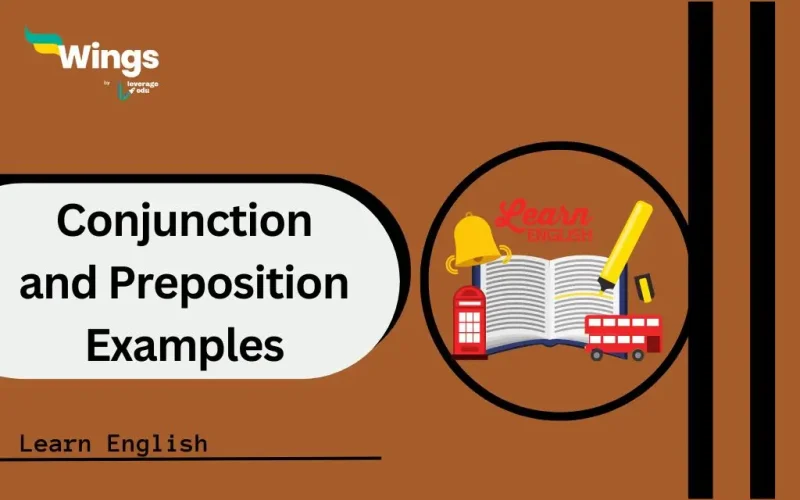Conjunctions and Prepositions are two fundamentally different, yet simultaneously used components of English grammar. The prior one helps to connect words, phrases, or clauses, whereas the latter one is meant to build a relationship between nouns, pronouns, and other words in a particular sentence. So, understanding these parts of speech is very important for effective and efficient communication. However, distinguishing between them can be challenging even for a proficient writer and language teachers. Therefore, the conjunction and preposition examples blog focuses on key areas of conjunction and preposition that you must learn to gain mastery over their usage.
This Blog Includes:
Conjunction and Preposition Examples and Meaning
Conjunctions and prepositions are essential elements of language that serve separate purposes in joining words, phrases, and clauses within sentences. Understanding their functions and usage is essential for useful communication.
Also Read: 9 Basic Rules in Grammar to Improve Your English
Meaning of Conjunction
Conjunctions are meant to bind words, phrases, and clauses together within a sentence and facilitate comprehensive communication. There are three types of conjunctions which include –
- Coordinating conjunctions: and, but, or, etc.
Examples – I like coffee, but his friend prefers tea
- Subordinating conjunctions: because, although, while
Examples – Because it was raining, he stayed indoors.
- Correlative conjunctions: either…or, neither…or
Examples – He is not only smart but also funny.
Conjunction Example Sentences
Below are examples that you can refer to:
- He likes to swim, and he enjoys hiking.
- She was tired, yet she continued to work.
- He has been studying hard since morning
Meaning of Preposition
Prepositions are used to identify positions either in space or in time. These always come before nouns to show time, directions, manner, or other relations. More importantly, there are four types of prepositions you should know:
- Simple Preposition (on, in, at, with, by, or, about, etc ),
- Compound prepositions (Because of, according to, spite of, mean of, etc),
- Participle Preposition (include, concerning, regarding, pending, etc),
Phases Preposition (in)
Examples of Preposition
Below are examples that you can refer to:
- The dog is on the table.
- The books are under the shelf.
- The functions start after noon.
- He sings with passion.
- She writes with a pen.
Difference between Conjunction and Preposition
Below are the differences between conjunctions and prepositions:
| Conjunction | Preposition |
| A conjunction is followed by a verb. | A preposition can be followed by a verb and a noun. |
| Conjunction is used independently in a sentence | On the other hand, prepositions cannot be used independently. |
| Conjunctions are mainly used to connect clauses, sentences and words. | A preposition is commonly used to show the relationship between certain words, phrases, etc. |
Conjunction and Preposition Exercise
Instruction: Identify whether it is a preposition or conjunction.
- He went to the store after work.
- Ria likes both tea and coffee.
- She stayed indoors because it was raining.
- We played soccer while the sun was shining.
- The books are on the table.
- He ran away from the dog.
- They can go to the park if the weather is good.
- She enjoys swimming and surfing.
- He is interested in sketching.
- She can have either tea or coffee.
Answer Key
- Preposition
- Conjunction
- Conjunction
- Conjunction
- Preposition
- Preposition
- Conjunction
- Conjunction
- Preposition
- Conjunction
Identify the Conjunction and Proposition in the following. Choose the correct answer for each sentence.
- He went to the store ____________ and brought some groceries.
- Conjunction
- Preposition
- He likes both tea ______________ coffee.
- Conjunction
- Preposition
- She ran quickly _______________ to catch the bus.
- Conjunction
- Preposition
- We couldn’t go to the beach because it was raining __________ we went to the cinema instead.
- Conjunction
- Preposition
- He sat next _______________ her during the meeting.
- Conjunction
- Preposition
Answer
- Preposition
- Conjunction
- Preposition
- Conjunction
- Preposition
Related Reads on English Grammar
FAQs
Prepositions are identified as the most commonly used preparation. They are short, simple words that are used to identify position either in space or in time.
There are 3 types of conjunctions: coordinating conjunctions, subordinating conjunctions, correlative conjunctions
The types of prepositions are Simple prepositions, Compound prepositions, Participle Prepositions, and Phrase prepositions.
This was all about the conjunction and preposition examples and their usage in English grammar. Hope you understand the concept and know how to proceed. You can also follow the Learn English page of Leverage Edu for more exciting and informative blogs.


 One app for all your study abroad needs
One app for all your study abroad needs












 60,000+ students trusted us with their dreams. Take the first step today!
60,000+ students trusted us with their dreams. Take the first step today!